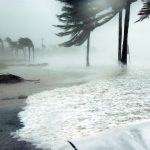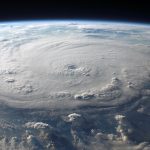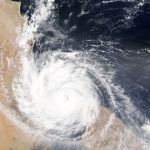 April 16, 2020 11:40 am
Published by Climate Extremes
April 16, 2020 11:40 am
Published by Climate Extremes
CLEX researchers and colleagues find Australia's infrastructure would be unable to deal with past flood events and thus is very likely to be unable to mitigate future flooding under climate change.
 April 16, 2020 10:06 am
Published by Climate Extremes
April 16, 2020 10:06 am
Published by Climate Extremes
New research finds Okubo-Weiss-Zeta parameter scheme has superior performance detecting tropical cyclone frequency characteristics compared to the CSIRO tracking scheme.
 April 15, 2020 3:18 pm
Published by Climate Extremes
April 15, 2020 3:18 pm
Published by Climate Extremes
Most climate models correct for current SSTs but don't correct for the reliability of future SSTs. This study shows that making that additional correction has a profound impact on how tropical cyclones will develop in a warmer world.
 April 15, 2020 1:51 pm
Published by Climate Extremes
April 15, 2020 1:51 pm
Published by Climate Extremes
To better assess the degree of organisation in radar observations CLEX researchers developed the Radar Organisation Metric (ROME). ROME's statistical properties suggest it is able to distinguish between the degree of convective organisation, and it also captures different regimes of the monsoon in Northern Australia.
 April 15, 2020 11:21 am
Published by Climate Extremes
April 15, 2020 11:21 am
Published by Climate Extremes
Models used to project future climate change, and impacts of climate change on plants and ecosystems, currently assume that mature forests will continue to absorb carbon over and above their current levels, acting as carbon sinks. The findings from this research suggest that those sinks may in actual fact be weaker or absent for forests on low-nutrient soils.
 April 15, 2020 10:26 am
Published by Climate Extremes
April 15, 2020 10:26 am
Published by Climate Extremes
This study presents a method for combining multiple observational datasets of the energy and water budgets at the land surface from different sources into a single hybrid dataset that conserves energy and mass.
 April 7, 2020 2:51 pm
Published by Climate Extremes
April 7, 2020 2:51 pm
Published by Climate Extremes
Research has established a link between Antarctic stratospheric winds and an increased risk of weather conducive to bushfires from late spring to early summer. Further research on the relationship between winds and ozone in the Antarctic stratosphere could improve seasonal forecasts for Australia.
 March 19, 2020 1:29 pm
Published by Climate Extremes
March 19, 2020 1:29 pm
Published by Climate Extremes
This two part paper examines the capacity of ACCESS to simulate tropical cyclone climatology and then used the same model to examine the relationship between climate variables and tropical cyclone formation.
 March 16, 2020 2:47 pm
Published by Climate Extremes
March 16, 2020 2:47 pm
Published by Climate Extremes
Focusing on the land regions around the world, the researchers assessed the representation of annual maximum of daily precipitation (Rx1day) across 22 observational products gridded at 1°x1° resolution.
 March 16, 2020 2:05 pm
Published by Climate Extremes
March 16, 2020 2:05 pm
Published by Climate Extremes
Observational studies over Darwin, Australia, show gravity waves provide a plausible explanation for the patterns of noteworthy variability in mesoscale motions. The findings suggest a two‐way coupling of clouds to their environment










